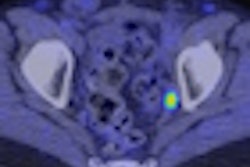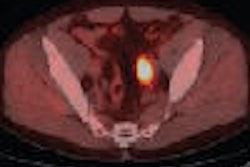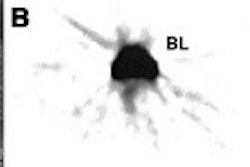Swiss researchers have found that PET/CT scans with the radiopharmaceutical choline can change treatment plans for certain patients with recurrent prostate cancer. Study results showed that choline-PET/CT significantly affected therapy management.
Researchers from University Hospital Zurich recommended that fluorine-18 (F-18) choline-PET/CT be considered for restaging patients with prostate-specific antigen (PSA) levels less than 2 ng/mL and Gleason scores of 7 or greater. Gleason scores are used to measure the severity of prostate cancer based on tissue sample results.
"Choline-PET is a promising tool for detecting the return of prostate cancer with a high clinical influence," said study co-author Dr. Jan David Soyka, from the university's Institute of Nuclear Medicine, in a presentation at the RSNA 2011 meeting. "However, the limitation of this examination is that in patients where PSA levels are low -- below 2 ng/mL -- we find many patients do not have positive findings. So, the question arose: Is there any subgroup of patients who may have an increased benefit from this examination?"
Soyka and colleagues retrospectively analyzed 229 patients with recurrent prostate cancer who were examined at their facility between March 2003 and 2007. All of the subjects underwent choline-PET/CT after being treated with surgery and/or radiation therapy. The researchers also evaluated patients in different subgroups to determine whether any treatment decisions were based on the choline-PET/CT exam.
The study included a questionnaire sent to referring physicians at 14 to 64 months after the examination, with a mean follow-up of 41 months. Soyka and colleagues received responses on 163 patients.
The questionnaire asked about the initial extent of disease, patients' Gleason scores and diagnoses, initial treatment, and PSA levels. Referring physicians were also asked to indicate a hypothetical treatment, if the choline-PET/CT results had not been available. In addition, referring physicians were asked about the treatment they recommended based on the choline-PET/CT images, and any changes that were made from those results.
Based on that information, Soyka and colleagues divided the patients into subgroups according to initial Gleason scores and PSA values before choline-PET/CT. The first group had Gleason scores of 6 or less, the second group had Gleason scores of 7 or 8, and the third group had Gleason scores of 9 or 10. The mean Gleason score was 6.9 at initial diagnosis.
Initial treatment included radical prostatectomy (119), radiotherapy (44), and combined prostatectomy and radiotherapy (seven).
Treatment modifications
Overall, Soyka and colleagues found that therapy changed for 78 (48%) of the 163 patients in the study. As for the subgroups, without taking into account the PSA values before choline-PET/CT, the initial Gleason score had no significant correlation with treatment changes based on scan results.
However, when PSA values and Gleason scores were both considered, the researchers found a significant correlation between Gleason score and the number of treatment plan changes in the group of patients with PSA values of 2 ng/mL or less. For this group, the Gleason score signaled choline-PET/CT-influenced changes in treatment plans in 28% of patients with Gleason scores of 6 or less and in 47% of patients with Gleason scores of 7 or 8.
"We found that the higher the Gleason score, the more therapeutic changes took place in these two groups," Soyka added, "with up to 71% of the group with Gleason scores of 9 and 10, which are the most aggressive tumors."
In patients with PSA values between 2 ng/mL and 5 ng/mL and greater than 5 ng/mL, the researchers found no significant correlation between Gleason score and number of treatments. However, an overall rate of 78% of treatment plan modifications due to choline-PET/CT was observed in the group of patients with a PSA value of 5 ng/mL or greater.
Based on the results, Soyka and colleagues concluded that in patients with recurrent prostate cancer and PSA levels less than 2 ng/mL, the likelihood of therapy changes due to choline-PET/CT correlated significantly with Gleason score. Choline-PET/CT had the highest clinical impact when PSA levels were less than 2 ng/mL and the Gleason score was 7 or greater.
"Even though choline-PET/CT is often negative in these patients, it should be considered for restaging if this higher Gleason score situation is present," Soyka said.



















